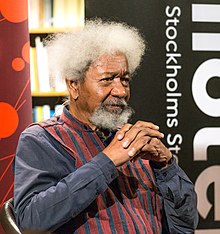Wole Soyinka | |
|---|---|
 Soyinka in 2018 | |
| Born | Akínwándé Olúwolé Babátúndé Sóyíinká[1] 13 July 1934 Abeokuta, Southern Region, British Nigeria |
| Occupation |
|
| Alma mater | |
| Period | 1957–present |
| Genre |
|
| Subject | Comparative literature |
| Notable awards | Nobel Prize in Literature 1986 Benson Medal from Royal Society of Literature 1990 Academy of Achievement Golden Plate Award 2009 Anisfield-Wolf Book Award, Lifetime Achievement 2012 Europe Theatre Prize - Special Prize 2017 |
| Spouse | Barbara Dixon
(m. 1958, divorced)Olaide Idowu
(m. 1963, divorced)Folake Doherty (m. 1989) |
| Children | 10, including Olaokun |
| Relatives | Ransome-Kuti family |
Akinwande Oluwole Babatunde "Wole" Soyinka CFR (/ˈwoʊleɪ sɔɪˈ(j)ɪŋkə, - ʃɔɪˈ-/ WOH-lay s(h)oy-(Y)ING-kə; Yoruba: Akínwándé Olúwọlé Babátúndé "Wọlé" Ṣóyíinká, pronounced [wɔlé ʃójĩnká]; born 13 July 1934) is a Nigerian playwright, novelist, poet, and essayist in the English language. He was awarded the 1986 Nobel Prize in Literature for his "wide cultural perspective and... poetic overtones fashioning the drama of existence",[2] the first sub-Saharan African to win the Prize in literature.[3][a]
In July 2024, President Bola Tinubu renamed the National Arts Theatre in Iganmu, Lagos, after Soyinka. Tinubu announced this in a tribute he wrote to celebrate Soyinka in commemoration of his 90th birthday.[4]
- ^ Wasson, Tyler; Gert H. Brieger (1 January 1987). Nobel Prize Winners: An H.W. Wilson Biographical Dictionary, Volume 1. The University of Michigan, US. p. 993. ISBN 9780824207564. Retrieved 4 December 2014.
- ^ "The Nobel Prize in Literature 1986 | Wole Soyinka". NobelPrize.org. The Nobel Prize. Retrieved 10 December 2013.
- ^ Ahmed, Abiy (9 December 2019). "Africa's Nobel Prize winners: A list". www.aljazeera.com. Retrieved 27 May 2020.
- ^ "Tinubu Immortalises Soyinka, Names National Theatre, Lagos After Him – THISDAYLIVE". www.thisdaylive.com. Retrieved 13 July 2024.
Cite error: There are <ref group=lower-alpha> tags or {{efn}} templates on this page, but the references will not show without a {{reflist|group=lower-alpha}} template or {{notelist}} template (see the help page).